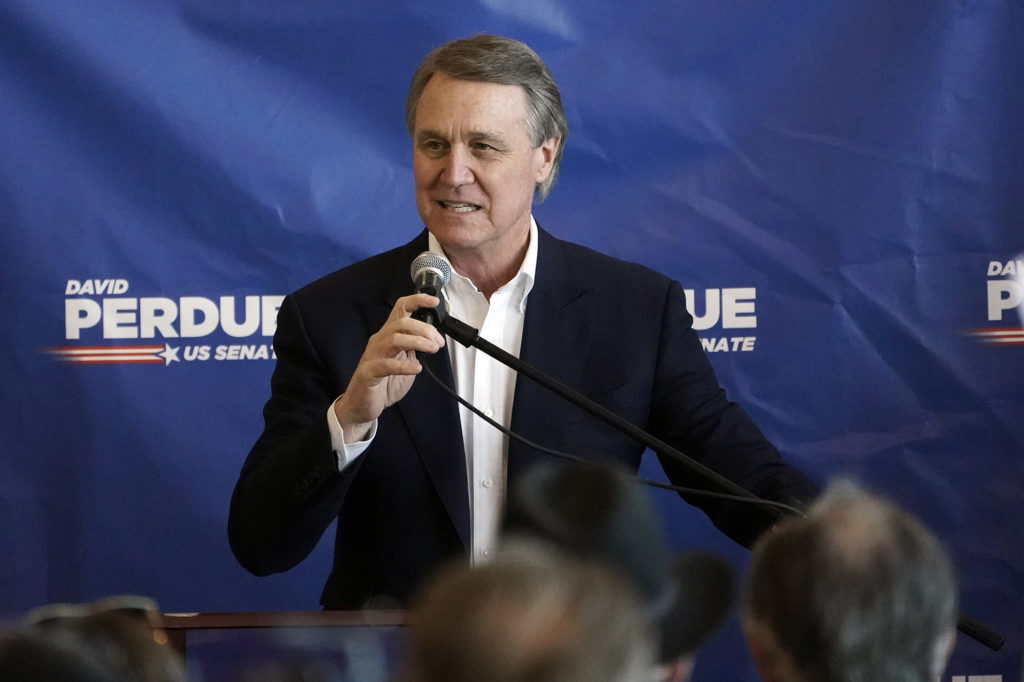
ATLANTA (AP) – The outcome in several contested states will determine whether Joe Biden defeats President Donald Trump. But if the Democratic challenger wins, the ambitions of a Biden presidency could well come down to Georgia.
Georgia, long a Republican stronghold – but one with rapidly changing demographics – could be the site of two runoffs on Jan. 5 to settle which party would control the Senate.
Should Democrats win them, Biden would be dealing with a majority in the Senate, increasing his chances for passing legislation and securing major appointment confirmations. Otherwise, Senate Majority Leader Mitch McConnell, a Kentucky Republican, could wield the power to block Biden.
Other races in North Carolina and Alaska also hold the potential to reshape the balance of power, but Georgia offers the more likely prospect.
In Georgia, two runoff elections would mean a campaign on an almost national scale, with tens of millions of dollars spent by both sides.
Biden has been mum on the Senate balance as he awaits the results in his own election, but he offered a preview days before Tuesday’s election.
“I can’t tell you how important it is that we flip the United States Senate. There’s no state more consequential than Georgia in that fight,” Biden declared at an Atlanta rally on Oct. 27, when he campaigned alongside Democratic Senate hopefuls Jon Ossoff and Raphael Warnock.
Votes were still being counted to determine whether Ossoff will meet Georgia Sen. David Perdue in a second round. Georgia law requires an outright majority to win a statewide office.
Separately, a Georgia special election to fill the unexpired term of former Sen. Johnny Isakson will require a runoff between Warnock and Sen. Kelly Loeffler, the Republican appointed to the post last year after Isakson retired.
Nationally, the Senate stands at 48-48. But Republicans lead uncalled races in Alaska and North Carolina. By Thursday, the focus had turned to Georgia’s Senate race. Then on Friday, election officials in the state announced there will be a recount in the presidential race due to its razor-thin margin.
Both sides promised unlimited funds would flow to the campaigns and onto the airwaves, and they predicted an all-star cast of campaigners for a state that in recent weeks drew visits from Biden, Trump, Vice President Mike Pence, Democratic vice presidential nominee Kamala Harris and former President Barack Obama.
McConnell almost certainly wouldn’t grant a floor vote to Biden’s proposal for a public option expansion of the 2010 Affordable Care Act or the Democrat’s proposed repeal of some of Trump’s top-end tax cuts. In 2016, citing precedent when an opposing party holds the Senate during a presidential election year, McConnell refused to grant Obama’s Supreme Court nominee, Merrick Garland, hearings or a vote.
In Georgia, Republicans and Democrats embraced the national frame, even as they talked up their candidates’ individual attributes. Loeffler is Georgia’s first female senator in the modern era. Warnock, pastor of the church where civil rights icon Martin Luther King Jr. preached, would be Georgia’s first elected Black senator.
“These are compelling candidates … but I think they have to accept it for what it is: a Democrats-versus-Republican race that’s all about the setup and authority in the Senate,” said Jack Kingston, a former congressman who narrowly lost a GOP Senate runoff to Perdue in 2014.
For Ossoff, it’s a bookend to the start of Trump’s tenure, when he ran for a suburban Atlanta House seat that became the most expensive congressional race in U.S. history to that point. He lost. Warnock, meanwhile, is making his first bid for public office.
From The Associated Press. May not be republished. AP writer Alexandra Jaffe contributed to this report from Washington.


















